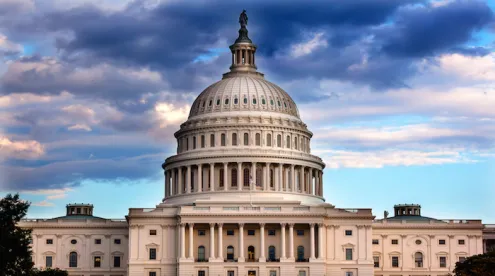American Rescue Plan Moves Forward.
Democrats in Congress are moving ahead with President Joe Biden’s “American Rescue Plan.” As of now—and this is still subject to change, of course—it appears that the U.S. House of Representatives’ budget and rules committees will both weigh in on the legislation early next week before sending the bill to the House floor toward the end of the week. At the Buzz, we are keeping an eye on the proposed $15 minimum wage and multiemployer pension fix provisions to see if they make it into the final House bill.
Biden Nominates NLRB GC.
On February 17, 2021, President Biden nominated Jennifer Abruzzo to be the general counsel of the National Labor Relations Board (NLRB). Abruzzo spent decades as an attorney at the NLRB and served as the Board’s acting general counsel between the terms of General Counsel Richard Griffin and General Counsel Peter Robb. Currently, Abruzzo serves as special counsel for strategic initiatives for the Communications Workers of America. Abruzzo also served during the recent presidential transition as a volunteer on then-President-elect Biden’s labor policy agency review team, which undoubtedly played a role in President Biden’s unprecedented decision to remove Robb as NLRB general counsel.
NLRB Seeks Input on Uniform Policies.
In other Board news, late last week the NLRB announced that it was soliciting feedback on its standard regarding employer uniform policies and whether they interfere with employees’ wearing of union insignia. Briefs are due on or before March 15, 2021.
Biden’s Immigration Plan Hits Congress.
On February 18, 2021, congressional Democrats introduced the U.S. Citizenship Act of 2021 in the House and U.S. Senate. Among other provisions, the bill clears backlogs for employment- and family-based visas, provides an eight-year path to citizenship, eliminates employment-based per-country visa caps, permits work authorization for H-4 visa holders, and creates a pilot program for regional economic development visas. However, the bill also allows the U.S. Department of Homeland Security to prioritize wages when allocating H-1B visa holders (and other nonimmigrant worker categories). Republicans aren’t terribly enthused with the bill, making its chance of passage—as written—pretty low. Certain provisions of the bill might be more successful if moved on their own as separate legislative initiatives.
EEOC Rulemaking News.
Several weeks ago, the Buzz discussed the White House’s “regulatory freeze” memorandum that ordered agencies to halt Trump administration regulations that were in the pipeline. Well, pursuant to that memorandum, the U.S. Equal Employment Opportunity Commission announced this week that it was withdrawing its proposed regulations under the Americans with Disabilities Act and the Genetic Information Nondiscrimination Act relating to employer-sponsored wellness programs. However, the Commission’s regulation on transparency in the conciliation process, which was finalized on January 14, 2021, was not impacted, and it went into effect on February 16, 2021.
Pregnancy Accommodation.
This week, a bipartisan group of congressional legislators reintroduced the Pregnant Workers Fairness Act (H.R. 1065). The bill would clarify protections for pregnant workers under federal antidiscrimination laws and require employers to provide reasonable accommodations—such as help with heavy lifting and more frequent restroom or water breaks—to those employees. The bill passed the House in 2020 by a vote of 329-73 (including 103 Republicans) and is supported by the U.S. Chamber of Commerce.
Fiduciary Rule in Effect.
In a bit of surprise move, the U.S. Department of Labor’s Employee Benefits Security Administration (EBSA) this week allowed the Trump-era rule, “Prohibited Transaction Exemption 2020-02, Improving Investment Advice for Workers and Retirees,” to go into effect on February 16, 2021. The rule allows financial advisors to collect fees when providing retirement savings investment advice. Often referred to as the “fiduciary rule,” the rule reinterprets the 2016 fiduciary regulation that was vacated by a federal court in 2018. EBSA announced that in the coming days it would “publish related guidance for retirement investors, employee benefit plans and investment advice providers.”
I’ll Toast to That.
February 20, 2021, marks the 88th anniversary of Congress’s passage of the Blaine Act, a joint resolution that initiated the repeal of Prohibition and the Eighteenth Amendment to the United States Constitution. The act is named after Senator John J. Blaine (R-WI), who chaired the Senate Judiciary Committee’s special subcommittee to address problems associated with the Eighteenth Amendment and its implementing legislation, the Volstead Act. The Blaine Act permitted states to hold conventions to vote to adopt the Twenty-First Amendment to the United States Constitution, which repealed the Eighteenth Amendment. On December 5, 1933, Utah became the 36th state to adopt the Twenty-First Amendment, which satisfied the constitutional requirement for ratification (two-thirds of the then 48 states). Repeal of Prohibition was undoubtedly a shock to one of the champions of the Eighteenth Amendment, Senator Morris Sheppard (D-TX), who at one time stated, “There’s as much chance of repealing the Eighteenth Amendment as there is for a hummingbird to fly to the planet Mars with the Washington Monument tied to its tail.”




 />i
/>i

